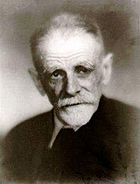Kostis Palamas facts for kids
Quick facts for kids
Kostis Palamas
|
|
|---|---|
 |
|
| Born | 13 January 1859 Patras, Greece |
| Died | 27 February 1943 (aged 84) Athens, Greece |
| Occupation | Poet |
| Nationality | Greek |
| Alma mater | University of Athens (no degree) |
| Signature | |
 |
|
Kostis Palamas (Greek: Κωστής Παλαμάς; born January 13, 1859 – died February 27, 1943) was a famous Greek poet. He is best known for writing the words to the Olympic Hymn, which is played at the Olympic Games. He was a very important writer in Greece during the late 1800s and early 1900s. He also helped start a group of writers called the New Athenian School.
Contents
About Kostis Palamas
Kostis Palamas was born in Patras, Greece. He grew up and went to school in a town called Mesolonghi. In 1877, he started studying law at the University of Athens, but he didn't finish his studies.
In the 1880s, he worked as a journalist, writing for newspapers and magazines. His first collection of poems, called Songs of My Fatherland, was published in 1886.
Palamas was nominated for the Nobel Prize for Literature 14 times, which is a very high honor for writers. However, he never won the award.
He worked at the University of Athens from 1897 to 1926. He passed away in 1943, during World War II, when Germany had taken over Greece. His funeral was a huge event for the Greek resistance, which was a movement of people fighting against the occupation. A fellow poet, Angelos Sikelianos, read a poem at the funeral that inspired many people. About 100,000 people gathered to protest against the Nazi occupation.
His Most Famous Work: The Olympic Hymn
Palamas wrote the lyrics for the Olympic Hymn. The music for the hymn was composed by Spyridon Samaras. This hymn was first performed at the very first modern Olympic Games in 1896, which took place in Athens.
For many years, each city that hosted the Olympics would create its own new song for the Games. But in 1958, the song by Samaras and Palamas was officially chosen as the permanent Olympic Anthem. Since the 1960 Winter Olympics, it has been played at every Olympic Games.
Honors and Influence
The old administration building of the University of Athens, where Kostis Palamas used to have his office, is now named the "Kostis Palamas Building" in his honor. This building also houses the "Greek Theater Museum" and hosts many art shows.
Many people called Palamas the "national poet" of Greece. He was a very important and respected writer for over 30 years. His ideas and writings greatly influenced the way people thought about politics and culture during his time. He helped bring attention to the works of other important Greek writers like Andreas Kalvos and Dionysios Solomos.
Main Works
Kostis Palamas wrote many different types of works, including poems, novels, and plays.
Collections of Poems
- Songs of my Fatherland (1886)
- Hymn to Athena (1889)
- Eyes of my Soul (1892)
- Iambs and Anapaests (1897)
- The Grave (1898)
- Twelve Lays of the Gypsy (1907)
- The King's flute (1910)
- Yearnings of the Lagoon (1912)
Prose (Novels)
- Death of a Youth (1901)
Theater (Plays)
- The Thrice-noble (1903)
Images for kids
-
Parnassos Literary Society. From left: Georgios Stratigis, Georgios Drossinis, Ioannis Polemis, Palamas at the center, Georgios Souris and Aristomenis Provelengios, poets of the New Athenian School (or Palamian School). Painting by Georgios Roilos
-
Residence of Palamas in Patras
See also
 In Spanish: Kostís Palamás para niños
In Spanish: Kostís Palamás para niños
 | May Edward Chinn |
 | Rebecca Cole |
 | Alexa Canady |
 | Dorothy Lavinia Brown |




